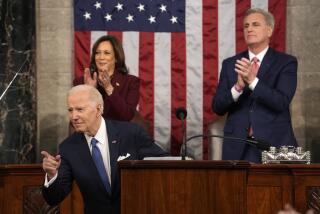More Executives Decry ‘Buy American’ Drive : Trade: Still, their Japanese firms prepare to take advantage of domestic content programs.
- Share via
Executives of leading Japanese companies are increasingly voicing tough criticism of the “Buy American” campaign, a movement designed to persuade U.S. citizens that they can bolster the domestic economy by eschewing foreign-made goods.
“ ‘Buy American’ is really a campaign to lay a guilt trip on the American people,” said Richard Recchia, executive vice president of Cypress-based Mitsubishi Motor Sales of America. Speaking last week at a forum sponsored by the Japan America Society of Southern California, he noted that U.S. auto makers place their nameplates on vehicles that they actually import. “ ‘Buy American’ doesn’t reflect the origin of a product. What it really reflects is a disguised campaign (against) Japanese products.”
The “Buy American” campaign, sparked in large part by Japan’s $41-billion trade surplus with the United States and the criticism of American workers earlier this year by prominent Japanese, strikes a particularly raw nerve in Southern California, which is home to the largest and most influential community of Japanese business executives in the United States.
The issue will take center stage again in June when Los Angeles residents vote on a ballot measure that would give domestic firms preference in bidding on city contracts.
The measure results from the January controversy over the Los Angeles Transportation Commission’s decision to grant--but later rescind--a $128-million contract to Japanese-owned Sumitomo Corp. of America to supply rail cars for a county mass transportation project.
At least 28 states have laws giving preference to American-made products. But it is difficult to judge a product by the corporate label on the cover, as is evident in the tangled manufacturing history of most automobiles sold in the United States.
Autos account for the largest part of Japan’s surplus with the United States, but many “Japanese” autos sold here are made in the United States, and some “American” autos are made abroad. Moreover, foreign-made parts account for an increasing part of American auto production.
Because of the international pedigree of many products, critics of domestic content legislation say such programs will be extremely costly, or virtually impossible, to implement.
“These (domestic content) proposals would restrict consumer and government choices in the area of goods and services,” said Akira Tsukada, general manager of Mitsubishi International Corp. and president of the Japan Business Assn. of Southern California. “Such restrictions would limit overall competitiveness, and competitiveness is the key to ensuring that all companies strive for quality.”
The JBA, a coalition of 700 firms employing about 60,000 Americans, will take no stand on domestic preference programs, but Tsukada said he expects more member companies in the coalition to speak out on the issue.
“Consumers should feel free to purchase the product of their preference--without any pressure,” said Masayuki Kohama, a Los Angeles-based senior representative for Hitachi Ltd.
However, while decrying “Buy American” programs, more Japanese companies are positioning themselves to take advantage of domestic content programs and to satisfy American consumers’ demand for American-made products.
Japanese auto makers, for one, are expected to expand their production facilities in the United States. In 1978, all Japanese vehicles sold in the United States were imported. But in 1991 nearly 40% of Japanese-labeled vehicles sold in this country were U.S.-made or assembled here from foreign-made parts.
By 1995, U.S.-produced Japanese vehicles will account for about 60% of the cars and trucks that Japan’s auto makers sell in this country, according to some industry forecasts.
Advocates of domestic content preference are generally encouraged by this trend. After all, they say such preference programs are designed to create or maintain American jobs. Indeed, U.S.-based Japanese executives say they expect Japanese manufacturers in other industries to also expand their U.S. production.






